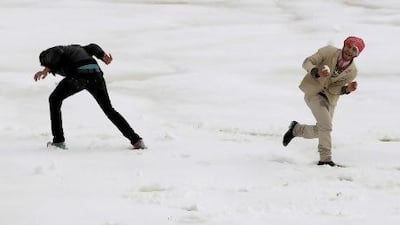RAMALLAH // Strong winds, torrential downpours and snowstorms paralysed communities stretching from Syria to the Nile Delta, killing two Palestinians, closing Egyptian ports and burying Jordan's capital, Amman, under a blanket of snow.
The hundreds of thousands of Syrians in refugee camps are the most vulnerable to the heavy rain and below-zero temperatures brought about by what Mohammed Samawi, a Jordanian meteorologist, called the "fiercest storm to hit the Middle East in the month of January in at least 30 years".
Ahmed Tobara, 44, is one of about 50,000 Syrian refugees at the Zaatari camp in northern Jordan. She said yesterday: "It's been freezing cold and constant rain for the past four days."
Flooding affected about 200 tents in the Jordanian camp, forcing refugees such as Mr Tobara out of their makeshift homes.
The two Palestinian women who were killed in flooding near the West Bank city of Tulkaram were among as many as nine people who have died during the spell of extreme weather in the region that began on Sunday.
The women, identified as Samah Kanan, 36, and Hana Al Sarawi, 24, were both from Nablus. The city's deputy governor, Annan Atirah, said floodwaters trapped them in their vehicle. The vehicle's driver was rescued but is reported to be in a serious condition.
A 30-year-old man froze to death in Taalabaya, in Lebanon's Bekaa province, after he fell asleep drunk in his car.
Low visibility coupled with high winds and heavy rain forced shut Mediterranean ports in Alexandria and Dakhila and interrupted commercial traffic through the Suez Canal, Egypt's official Mena news agency reported.
Ten fisherman from Marsa Matruh went missing after their boat capsized, according to Mena, which also said power outages spanned areas just north of Cairo to the coast. In Jordan, meanwhile, snow fell in the north and even in the drier south as authorities shut schools and delayed international flights.
Officials advised people to stay home as municipal snowplows struggled to clear nearly 30 centimetres of snow in the capital, Amman, whose residents are accustomed to periodic, albeit relatively light, snowfalls.
Both Palestinians and Israelis in the highland areas of Jerusalem and the West Bank Palestinian administrative capital of Ramallah awoke to a thin layer of snow and sleet coupled with the incongruent claps of thunder yesterday morning.
Although the snow offered picturesque scenes of hills and holy sites, such as Jerusalem's Haram Al Sharif, a shrine revered by both Muslims and Jews, officials took no chances. Palestinian schools closed as relatively few drivers braved Ramallah's slippery streets or formidable pools of rainwater that collected near the Israeli checkpoint at Qalandia, which separates West Bank Palestine from Jerusalem.
Nearly a metre of snow had fallen on Mount Hermon, in the Israeli-occupied Golan Heights, likely exciting winter-sports enthusiasts waiting to ski and snowboard the mountain's slopes.
Israeli police, however, asked drivers to avoid parts of Tel Aviv after rain flooded the coastal city's usually parched Ayalon River, forcing authorities to temporarily close the adjacent motorway and causing traffic jams. Train networks operating across the country have experienced temporary closures as Benjamin Netanyahu, the prime minister, yesterday planned to meet the police chief and minister of public security to "evaluate the situation".
On Tuesday, an Israeli military spokesperson said soldiers were called to assist a bus carrying 30 Palestinian children and a bus stranded by rainwater near the West Bank city of Jenin.
Also, in the Hamas-run Gaza Strip, power outages affected scores of residents as authorities struggled to evacuate dozens of people threatened by floodwaters.
Rain and snow are expected to continue Jordan as well as Jerusalem and the West Bank today, with skies clearing across the region by Friday evening.
Follow
The National
on
& Hugh Naylor on

